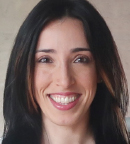
Rosa Nouvini, MD
In this period of time, more than ever before, I feel the dichotomy of being a non-Hispanic White American vs a person of color. Through the COVID-19 pandemic, I rode the subway to the Memorial Sloan Kettering Ralph Lauren Cancer Center clinic in Harlem, where I was often the only White person on the train, amid mostly Black individuals and other people of color and ethnicity. I wondered who was riding to work out of the necessity to feed their families and provide front-line services. Who was riding because they did not have the luxury to work from home? Who might return to an overcrowded dwelling and too closely interact with loved ones, despite falling ill with COVID-19, because the luxury of social distancing is scarce? I recognized that I could get my groceries delivered and avoid the potential for risk of exposure at a supermarket. I could socially distance in my Manhattan apartment. I could avoid food and financial insecurity. I reflected on how I faced few barriers in pursuit of a higher education and a financially secure career.
Breaking Down Barriers to Equitable Care
My patients wept as they broke the bad news that their family members and friends had died of COVID-19. It was devastating each time I’d hear this news, and even more so knowing structural racism in health care contributed to these Black and Hispanic lives lost disproportionately during the COVID-19 pandemic.
At our clinic in a predominantly Black and Hispanic community, one goal in our mission is to break down the barriers to accessing high-quality and timely health care, to level the playing field. We incorporate the social determinants of health into all of our patient encounters, which takes into account economic stability, education, access to health care, and literacy, as well as neighborhood and social networks. Addressing these socioeconomic factors enables most of our patients to successfully complete their treatments, and it is not too difficult to accomplish.
“It is the sincere interest in learning about each other’s struggles and joys that brings us closer, reveals barriers, breaks biases, unites us as humans….”— Rosa Nouvini, MD
Tweet this quote
Many communities already have resources such as food pantries and support groups. There are websites such as www.chemocare.com, which, in basic language, provides cancer type and treatment information and translates it into Spanish. Many insurance companies cover medical transportation, and there are charity organizations that can help with this, too. If we increase our awareness of the issues patients may face, our awareness of resources to help them will increase as well.
Someone to Lean on During Unprecedented Times
During the height of the COVID-19 pandemic in New York City, my colleagues and I would often receive calls from patients falling ill with the coronavirus who could not get in touch with their primary care physicians, who were already overburdened because of a broken health-care system. These people were not just patients with cancer, but those with benign hematologic conditions, whom we may have only met once. We searched for and shared resources in English and Spanish, called food pantries, made sure all medications were prescribed for several months, and gave our cell phone numbers so our patients could feel the safety of our being a quick call away if their condition worsened. Our relationships deepened with our patients and their families, as we spoke more frequently to quell their fears and manage COVID-19 infections. We got to know their children, spouses, and parents on a more intimate level, as we all “telemedicined” together from New York and other parts of the world.
I’ll never forget the frantic call I received from one patient’s daughter when she herself fell ill with COVID-19 while they were quarantining together. We went through all of the steps necessary to protect her mother as well as to take care of herself. When my patient got on the phone with me, the first thing she asked was, “Doctura, are you okay? I’ve been worried about you.”
When I reflect on this period of time and how we became “go-to” providers for so many of our patients during this pandemic, I think about the relationships we enjoy at our center; during each visit, we have the luxury of getting to know our patients for who they are beyond a diagnosis. Some who may be immigrants share how lonely it is being the breadwinner, living and working in the land of opportunity to support family abroad, and still others who share the joy of singing on Sundays in Harlem churches. It is the sincere interest in learning about each other’s struggles and joys that brings us closer, reveals barriers, breaks biases, unites us as humans, and motivates us to fight harder to hold our doors wide open and welcome whoever needs cancer care.
Introspection and Growth
When thinking about the current state of underserved communities and how we can and must do better, I think about implicit racial bias, that unconscious bias that propagates and preserves racism in all forms. We are all products of the culture we grew up in, andwe may or may not recognize our own implicit biases. I admit this is something I’ve been working on. The remorse I feel for our disparate experiences is overwhelming at times. Into what we were born was all just a matter of chance.
Now more than ever, aside from standing up together against racism, we need to look within ourselves and resolve any biases. Take this moment right now to recognize the different perceptions and emotions that come up when we see and interact with each other.These subtle shifts within us collectively can help shift our society in the right direction. We need to know and appreciate each other’s joys and struggles. It’s a place to start.
Dr. Nouvini is a hematologist oncologist practicing at Memorial Sloan Kettering Ralph Lauren Cancer Center, New York.
DISCLOSURE: Dr. Nouvini reported no conflicts of interest.

